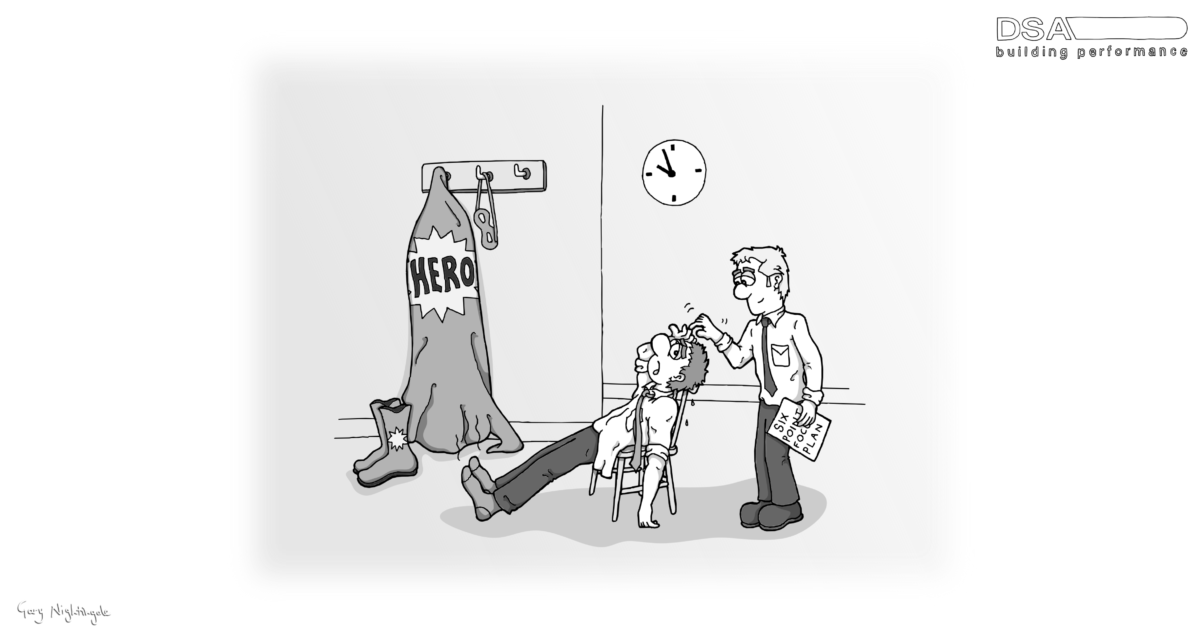We don’t need another hero: Here’s how you can start activating your team

Many years ago when I was a site project manager, my boss Jeff asked what we talked about in our weekly team meetings.
“What weekly team meetings?” I said.
I just worked out what needed to be done and issued orders. There was only one way to get the job done, and it was my way.
In fact, it was rarely that simple. I had to work long, frantic days plugging holes and bailing to keep the ship afloat.
I also meddled in everyone’s accountabilities, trying to fix their problems, although I’m not sure how many of my solutions worked, or even how many problems my rigid approach caused.
I was trying to be the “hero manager”, the only one around who knew what needed to be done and how to do it. It sucked initiative out of the team.
It’s a command-and-control style of management, which is exhausting. I kept wondering what on earth was wrong with everybody. Or was it me?
“I’d like you to start having them,” Jeff said.
Then he said: “Here’s a little approach you could use, although of course you don’t have to if you don’t want to, Dave. It’s your project.”
He was subtle like that.
He told me about the “Six Point Focus Plan”. It was a revelation to me, and it worked a treat.
Pick six things
You get the team together once a week for an hour. Friday is a good.
You ask: “Over and above above everything else, what six things do we need to achieve next week?”
A typical list could be:
1. Complete and issue the project procurement schedule;
2. Pour building 2 ground floor slab;
3. Complete drain run MH8 to MH10;
4. Complete formwork and rebar for sludge tank 3 roof;
5. Appoint structural steel subcontractor;
6. Compile and review the month’s cost/value report.
Because the team compiles the list after a full and frank discussion, the team has joint ownership of what’s most important for the project right now.
Next Friday, the team reviews progress on the six points and resets the Six Point Focus Plan.
It’s a really simple “Plan, Do, Review” cycle.


Coach for Results
Designed with young professionals in mind
Perform better in your current role, become an effective manager and over time a great leader and together we will change the construction industry.
So, how’d we do?
You score the effectiveness of your team with simple maths. If the team gets three of six items done, it has been 50% effective that week.
That score is a good jumping off point for the last 15 minutes of the meeting, in which we explore how we can improve how we’re working together. This is working “on” the team.
It’s a good chance to ask why we were only 50% effective this week.
Did we overestimate what’s possible last week? Or, are there other issues that prevented us being 100% effective?
Are we communicating effectively enough? How could we do it better?
Do we need to fine-tune roles and accountabilities?
Can we accommodate individual team members’ strengths and working styles better?
The objective is to draw the team ever closer together to ensure all six things get done.
Frequently asked questions
1. Does it have to be six things? Six is a good number because it allows diversity of thought and a good range of objectives. Any more than six dilutes focus.
2. What about everything else that needs to happen on the project? It still needs to happen. Each team member still has their day job. The six things pertain to when the team has to flex to get big things done together.
3. What about external factors getting in the way? Yes, the team needs to consider all relevant, known and likely factors, internal and external, that may affect progress. No one person will have a handle on everything; diversity of thought and experience gives the best chance of success.
4. What if we pick six easy things, score 100% and pat ourselves on the back? You’re guided by the project programme; you won’t have the luxury of “easy things”, and the project manager is in the meeting.
5. What if the project manager overrules us and dictates the list? Try pointing out that collaborative planning is better.
Adopting a coaching style of management
Command-and-control is an exhausting and ineffective style of management. For those on the receiving end, it stifles initiative, engagement and growth.
The world has moved in the 30 years since I was a young project manager.
Nowadays young professionals tell me they can’t get time with their boss because the boss is too busy. Project seniors tell me that it’s HR’s job to develop their staff. HR don’t agree, by the way.
Also, we have learned a lot about how to get the best out of people since the early 90s: the art has moved on considerably.
Now young professionals want to be coached, not ordered around.
From 20 years as a leadership team coach in construction, I’ve condensed the essentials of a coaching style of management and I am sharing them in our Coach for Results programme, now open for enrolment at the CIOB Academy, here.
If you are a young professional this is a development opportunity for you and if you are working under a dictator and somehow need to manage upwards then it’s definitely for you.
